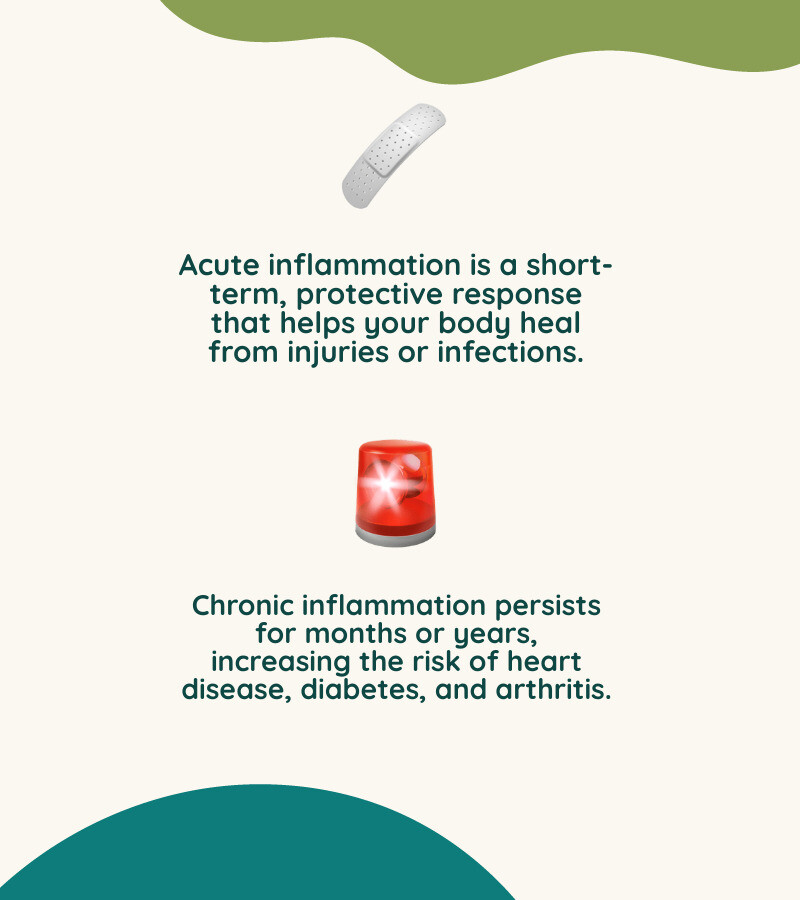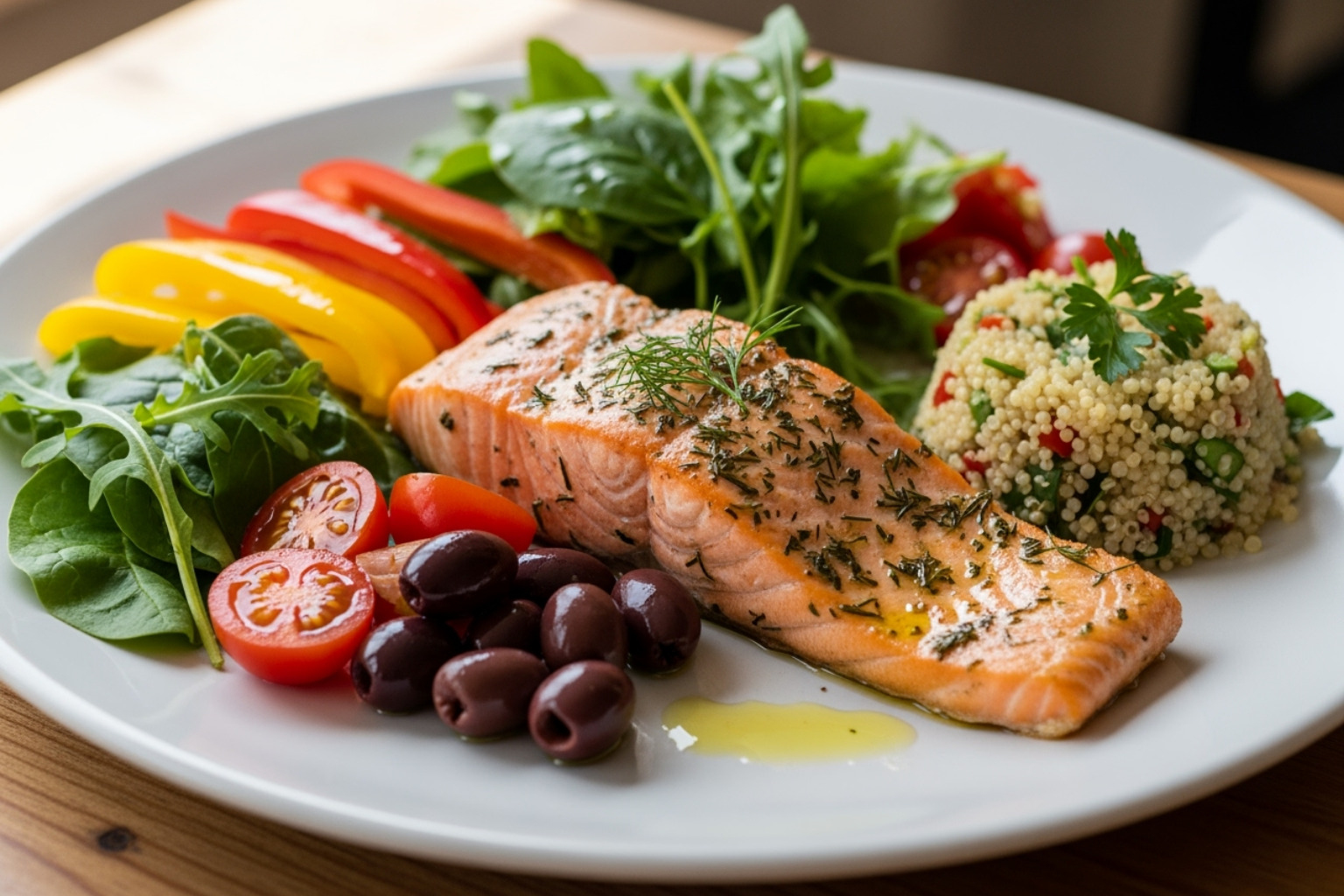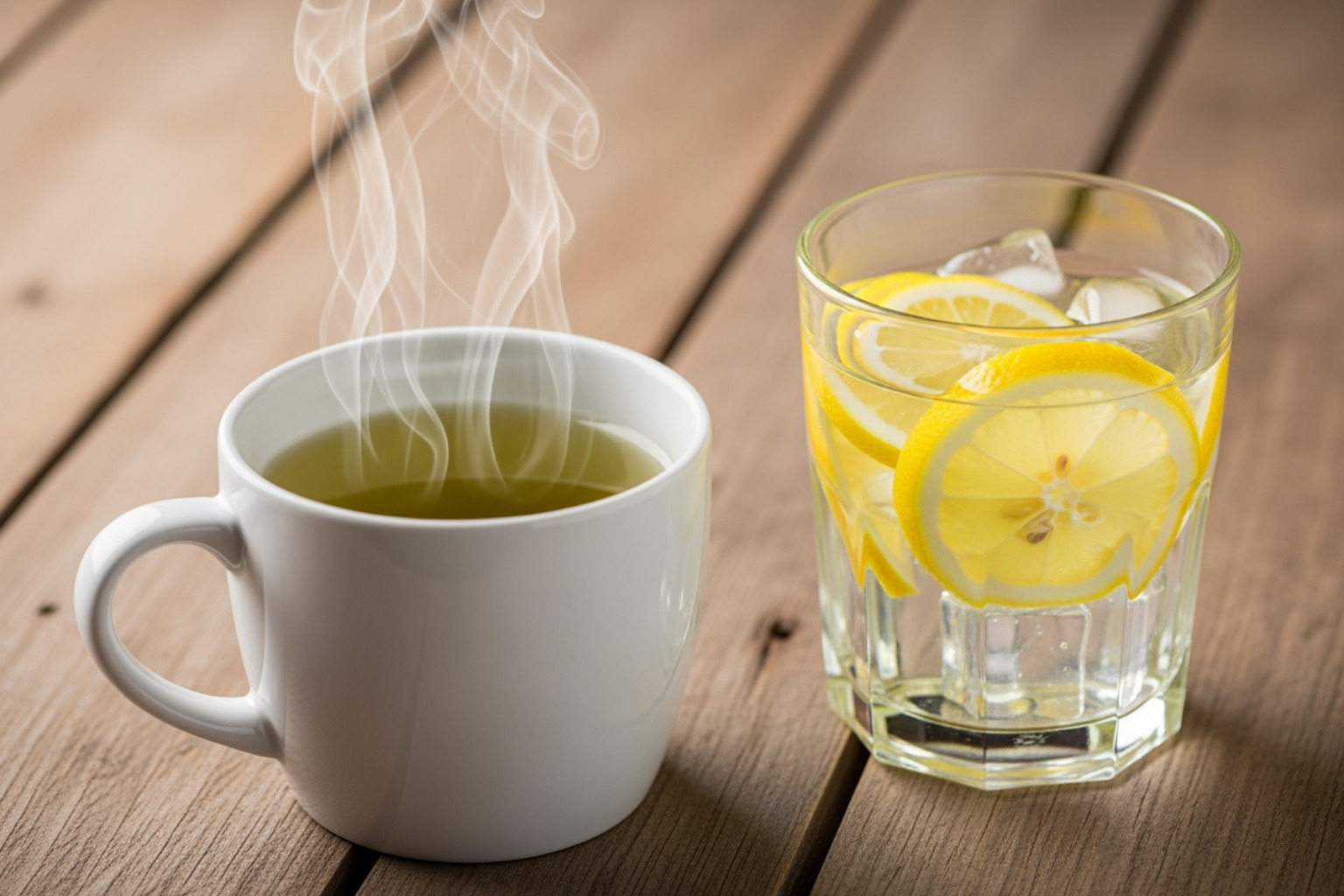What is Inflammation and Why Should You Care?
Natural anti inflammatory options include foods like berries and fatty fish, supplements such as omega-3s and curcumin, and topical creams with ingredients like menthol. These work by targeting inflammatory pathways and reducing markers like C-reactive protein (CRP).
Quick Anti-Inflammatory Actions:
- Eat More: Salmon, berries, broccoli, avocados, turmeric, ginger, green tea
- Avoid: Processed foods, sugary drinks, fried items, refined carbs
- Supplement: Omega-3s (fish oil), curcumin with black pepper, boswellia
- Apply Topically: Natural creams with menthol, aloe, or capsaicin for targeted pain relief
Inflammation is your immune system's response to foreign invaders like microbes or chemicals. This short-term, or acute inflammation, is a good thing—it's how your body heals a cut or fights an infection.
However, when this response doesn't shut off, it becomes chronic inflammation, a long-term problem linked to major diseases like heart disease, type 2 diabetes, arthritis, and Alzheimer's.
The good news is that you can manage inflammation. Natural anti inflammatory strategies—through diet, supplements, and topical solutions—can help reduce pain, lower disease risk, and improve your quality of life by targeting the body's inflammatory pathways.
I'm Tony Enrico, and my work is dedicated to helping people find fast, natural relief from pain and inflammation. With solutions like Neuropasil, our goal is to help 1 million people across North America manage their pain naturally by 2028.

Fuel Your Body: The Anti-Inflammatory Diet
Your fork is one of the most powerful tools for fighting inflammation. Every meal is an opportunity to either fuel or cool inflammation, making food choices a core part of any natural anti inflammatory strategy.
Way 1: Adopt an Anti-Inflammatory Eating Pattern
An anti-inflammatory diet isn't about one magic ingredient; it's about a pattern of eating whole, unprocessed foods that work together to calm inflammation.

The Mediterranean diet is a gold standard, proven to reduce inflammation. It emphasizes fruits, vegetables, whole grains, nuts, legumes, and olive oil, with moderate fish and poultry. This plant-forward approach loads your body with antioxidants and polyphenols that fight inflammation at a cellular level.
This way of eating also supports your gut. A healthy gut microbiome helps regulate your immune system and reduce systemic inflammation. Fiber is essential for this, yet most Americans only get about half the recommended amount (25g for women, 38g for men), according to UCSF Health. Fiber from whole foods is particularly effective at lowering C-reactive protein (CRP), a key inflammation marker. Research on the Mediterranean diet's benefits consistently shows it reduces inflammatory markers and the risk of chronic disease.
Way 2: Load Up on These Powerhouse Foods
While the overall pattern is key, certain foods are natural anti inflammatory superstars.
- Berries and cherries: Their vibrant colors come from anthocyanins, antioxidants with potent anti-inflammatory effects. Studies show daily strawberry consumption can lower heart disease-related inflammatory markers, while tart cherry juice for CRP reduction has also been demonstrated.
- Fatty fish: Salmon, mackerel, and sardines are rich in omega-3 fatty acids (EPA and DHA). Your body converts these into inflammation-fighting compounds called resolvins and protectins. People who eat salmon or take omega-3 supplements often see a reduction in CRP. Salmon's effect on C-reactive protein is well-documented.
- Cruciferous vegetables: Broccoli, kale, and Brussels sprouts contain sulforaphane, an antioxidant that lowers inflammation by reducing cytokines and NF-κB, molecules that drive the inflammatory process, as detailed in scientific reviews.
- Healthy fats: Avocados offer potassium, fiber, and heart-healthy fats, and have been shown to lower inflammatory markers. Extra virgin olive oil contains oleocanthal, an antioxidant with anti-inflammatory effects comparable to ibuprofen.
Way 3: Spice Up Your Meals with a Natural Anti Inflammatory Kick
Your spice cabinet is full of natural anti inflammatory ingredients that add flavor and healing power.
- Turmeric: Its active compound, curcumin, powerfully reduces inflammation. For maximum effect, always pair it with black pepper; the piperine in pepper dramatically boosts curcumin absorption. The curcumin and piperine's effect on CRP is significant.
- Ginger: Contains gingerol, which has both anti-inflammatory and antioxidant effects, offering relief for conditions like osteoarthritis, according to the Arthritis Foundation.
- Bell and chili peppers: Loaded with vitamin C and antioxidants. Bell peppers provide quercetin, while chili peppers contain capsaicin, a fantastic natural anti inflammatory that can lessen pain signals.
Way 4: Sip Smart with Anti-Inflammatory Drinks
What you drink is as important as what you eat. The right beverages are powerful allies in your natural anti inflammatory plan.

- Green tea: Rich in EGCG, a potent antioxidant that inhibits inflammation by reducing pro-inflammatory cytokine production. Reduced risk of chronic conditions like heart disease and cancer is linked to green tea consumption. (Note: It can reduce iron and folic acid absorption, so consult a doctor if you are pregnant or have anemia).
- Water: Staying hydrated is crucial for flushing out toxins and managing inflammation.
- Limit sugary drinks: Sodas and sweetened juices are major inflammation triggers. Stick to water or unsweetened tea.
Beyond Diet: Supplements and Topical Solutions
Even with a great diet, you might need extra support. That's where natural anti inflammatory supplements and topical solutions can provide a more concentrated approach.
Way 5: A Guide to Natural Anti Inflammatory Supplements
Supplements can improve an anti-inflammatory diet by providing a more potent dose of key compounds.
- Fish Oil (Omega-3s): If you don't eat fatty fish regularly, a high-quality fish oil supplement provides the EPA and DHA needed to reduce inflammatory markers like CRP. Research shows that these supplements can lead to notable reductions in inflammation.
- Curcumin: Getting therapeutic amounts of curcumin from turmeric spice alone is difficult. A supplement, especially one paired with piperine (black pepper extract) for improved absorption, can be highly effective for conditions like arthritis. Studies on curcumin and piperine show significant drops in CRP levels.
- Boswellia: Also known as frankincense, this ancient resin is excellent for easing joint inflammation and pain. The Arthritis Foundation notes it may help reduce cartilage loss. You can learn more about Boswellia's benefits and how it works.
- Zinc: This mineral is crucial for managing inflammation and oxidative stress. Zinc supplementation may reduce infection rates in older adults. However, more is not better; exceeding the Tolerable Upper Intake Level of 40 mg per day can backfire.
- Vitamins A, D, and E: These vitamins are essential supporting players that contribute to immune function and help your body manage inflammation effectively. For more details, see this comprehensive fact sheet.
Important: "Natural" doesn't always mean "safe." Supplements can interact with medications and have side effects. Always consult with a healthcare provider before starting any new supplement, especially if you have existing health conditions or take other medications. They can help you determine the right approach and dosage for your specific needs.
Way 6: Applying a Natural Anti Inflammatory for Targeted Relief
When pain is localized in a knee, shoulder, or your back, a topical solution can provide direct relief.
Topical natural anti inflammatory creams deliver relief directly to the source of discomfort, offering faster action with fewer systemic side effects. This is a game-changer for flare-ups from the gym, a stiff neck, or chronic joint pain.
At Neuropasil, we specialize in this targeted approach. Our natural, fast-acting topical creams use a unique blend of Aloe, Urea, and Menthol. Menthol provides a cooling sensation that relaxes tense muscles, while Aloe and Urea help the active ingredients penetrate the skin for deep, soothing relief. Our customers, including athletes, use it for everything from neuropathy and sciatica to fibromyalgia, sprains, and general aches and pains. The feedback is consistent: fast, targeted relief without the side effects of oral medications.
Capsaicin cream is another excellent topical. Derived from chili peppers, it works by temporarily reducing Substance P, a neurotransmitter that sends pain signals to the brain. Research on topical capsaicin shows it can provide significant relief for nerve and musculoskeletal pain. Just be sure to wash your hands after application.
Fine-Tuning Your Lifestyle to Fight Inflammation
You can eat all the salmon and berries you want, but if you're also consuming inflammatory foods, you're fighting an uphill battle. Avoiding certain triggers and using smart cooking methods are key to giving your body's anti-inflammatory defenses a fighting chance.
Way 7: Avoid These Common Inflammatory Triggers
Just as some foods are fire extinguishers, others are like gasoline on the flames. Limiting these is crucial for a natural anti inflammatory lifestyle.

- Sugar-sweetened beverages: Sodas, energy drinks, and many fruit juices are loaded with added sugars that spike blood sugar and trigger inflammation. Research clearly links sugar-sweetened beverages and inflammation to higher levels of CRP.
- Refined carbohydrates: White bread, pastries, and many cereals are stripped of fiber and act like sugar in your body, causing similar inflammatory spikes.
- Fried foods: Besides unhealthy fats, the high-heat frying process itself creates inflammatory compounds.
- Processed meats: Bacon, hot dogs, and deli meats are often high in saturated fat, sodium, and preservatives that promote inflammation.
- Trans fats: Found in some processed foods and baked goods, these artificial fats (check labels for "partially hydrogenated oils") are notorious inflammation promoters.
Smart Cooking for Less Inflammation
How you cook matters. High-heat cooking methods like frying and char-grilling create inflammatory compounds called Advanced Glycation End products (AGEs). Gentler methods like baking, steaming, stewing, or light stir-frying are better choices as they minimize the formation of these harmful compounds.
A bonus tip: cooking with extra virgin olive oil can boost the anti-inflammatory power of your food. For example, research shows that cooking tomatoes in olive oil helps you absorb more of their lycopene, a powerful antioxidant. Using EVOO as your primary cooking fat is a smart move for reducing inflammation.
Frequently Asked Questions about Natural Anti-Inflammatories
Let's explore some common questions about managing inflammation naturally.
What is the most powerful natural anti-inflammatory?
There's no single "most powerful" natural anti inflammatory. The best approach is synergistic, combining multiple strategies. However, if we look at the research heavyweights, curcumin (from turmeric) and omega-3 fatty acids (from fish oil) are consistently at the top. They have been studied extensively and show impressive results in reducing key inflammatory markers like CRP.
The most powerful strategy is a holistic one: a diet rich in anti-inflammatory foods, targeted supplements when needed, stress management, and quality sleep. The right choice for you depends on your specific needs, which is why consulting a healthcare provider is so valuable.
How can I reduce inflammation in my body fast?
While chronic inflammation takes time to resolve, you can take steps for quick relief.
- Adjust Your Diet Immediately: Eliminate sugar-sweetened drinks and processed foods. This can quickly reduce your body's inflammatory load.
- Hydrate: Drink plenty of water to help flush out inflammatory compounds.
- Drink Green Tea: The EGCG in green tea can start working quickly to reduce inflammation.
- Eat a Power Meal: A large salad with leafy greens, colorful vegetables, and grilled salmon dressed with extra virgin olive oil delivers a concentrated dose of anti-inflammatory compounds.
- Go Topical for Localized Pain: For sore muscles or joint pain, a natural anti inflammatory cream can provide relief in minutes. Products like Neuropasil, with menthol, aloe, and urea, work directly at the site of discomfort. The cooling menthol provides an immediate sensation of relief while the other ingredients soothe the area, allowing you to feel better almost instantly.
Are natural anti-inflammatories safe?
This is a crucial question. The answer depends on the type.
- Foods: Anti-inflammatory whole foods like berries, fatty fish, and leafy greens are overwhelmingly safe and beneficial for almost everyone.
-
Supplements: These require more caution. "Natural" does not mean risk-free.
- Dosage matters: Too much of a good thing, like zinc, can be harmful.
- Interactions are possible: Fish oil can interact with blood thinners, and turmeric can affect diabetes medications.
- Quality varies: The supplement industry is not as strictly regulated as pharmaceuticals. Look for reputable brands with third-party testing.
Because of these risks, we can't stress this enough: Consult a healthcare provider before starting any new supplement regimen. This is especially true if you have existing health conditions, are pregnant, or take other medications. Your doctor can help you create a safe and effective plan.
Topical solutions generally have an excellent safety profile because they work locally, but it's always wise to do a patch test first to check for skin sensitivity.
Conclusion: Your Action Plan for a Less Inflamed Life
We've explored seven practical ways to use natural anti inflammatory strategies, from adopting a Mediterranean-style diet to avoiding inflammatory triggers and using targeted supplements and topicals.
The key to success isn't perfection, but consistency. A holistic approach works best, as diet, lifestyle, and targeted solutions all work together to support your body's natural healing abilities. By taking these proactive steps, you're not just masking symptoms—you're addressing root causes and taking control of your health, reducing your risk of chronic diseases.
We know that sometimes you need relief now. When sore muscles, stiff joints, or nerve pain flare up, you need something that works fast. That's why we created Neuropasil. Our natural topical cream, with its blend of Aloe, Urea, and Menthol, delivers fast-acting, soothing relief right where you need it. It's trusted by athletes and people dealing with conditions like neuropathy, sciatica, and fibromyalgia for targeted relief that helps them stay active.
Ready to take the next step? You can find our fast-acting pain relief creams and experience the difference that targeted, natural relief can make. Combined with the anti-inflammatory lifestyle strategies we've discussed, you'll have a powerful toolkit for managing pain and inflammation naturally. You have more control than you think—start today.
References
Throughout this article, we've drawn on research from trusted medical institutions and peer-reviewed studies to bring you accurate, science-backed information about natural anti inflammatory strategies. Below are the sources cited in the text.
- Cleveland Clinic. (n.d.). Inflammation. Retrieved from https://my.clevelandclinic.org/health/symptoms/21660-inflammation
- Tutunchi, H., et al. (2022). The Effects of the Mediterranean Diet on Inflammatory and Endothelial Function Markers in Patients with Metabolic Syndrome and Related Disorders: A Systematic Review and Meta-Analysis of Randomized Controlled Trials. Nutrients. Retrieved from https://www.ncbi.nlm.nih.gov/pmc/articles/PMC9782563/
- UCSF Health. (n.d.). Increasing Fiber Intake. Retrieved from https://www.ucsfhealth.org/education/increasing-fiber-intake
- Chai, S. C., et al. (2019). Effects of Tart Cherry Juice on Biomarkers of Inflammation and Oxidative Stress in Older Adults. Nutrients. Retrieved from https://www.ncbi.nlm.nih.gov/pmc/articles/PMC6413159/
- Dighriri, I. M., et al. (2022). Effects of Salmon Consumption on C-Reactive Protein (CRP) and Other Inflammatory Markers. Journal of Personalized Medicine. Retrieved from https://pubmed.ncbi.nlm.nih.gov/35914448/
- Bai, Y., & Wang, X. (2016). The Role of Sulforaphane in the Central Nervous System. Molecules. Retrieved from https://www.ncbi.nlm.nih.gov/pmc/articles/PMC5216921/
- Dehghani, S., et al. (2022). The Effects of Avocado on Fasting Blood Sugar, Inflammatory Factors, and Anthropometric Indices: A Systematic Review and Meta-Analysis. Phytotherapy Research. Retrieved from https://www.ncbi.nlm.nih.gov/pmc/articles/PMC8745324/
- Lucas, L., et al. (2014). Molecular Mechanisms of Inflammation. Anti-Inflammatory Benefits of Virgin Olive Oil and the Phenolic Compound Oleocanthal. Current Pharmaceutical Design. Retrieved from https://www.ncbi.nlm.nih.gov/pmc/articles/PMC4139846/
- Panahi, Y., et al. (2015). Curcuminoids-piperine combination in patients with metabolic syndrome: a randomized controlled trial. Complementary Therapies in Medicine. Retrieved from https://pubmed.ncbi.nlm.nih.gov/25618800/
- Arthritis Foundation. (n.d.). Ginger. Retrieved from https://www.arthritis.org/health-wellness/treatment/complementary-therapies/supplements-and-vitamins/ginger
- Ware, M. (2019). What are the benefits of bell peppers? Medical News Today. Retrieved from https://www.healthline.com/nutrition/foods/bell-peppers
- Ohishi, T., et al. (2020). Anti-inflammatory Action of Green Tea. Anti-Inflammatory & Anti-Allergy Agents in Medicinal Chemistry. Retrieved from https://www.ncbi.nlm.nih.gov/pmc/articles/PMC7796401/
- Arthritis Foundation. (n.d.). Indian Frankincense. Retrieved from https://www.arthritis.org/health-wellness/treatment/complementary-therapies/supplements-and-vitamins/indian-frankincense
- Siddiqui, M. Z. (2011). Boswellia Serrata, A Potential Antiinflammatory Agent: An Overview. Indian Journal of Pharmaceutical Sciences. Retrieved from https://www.ncbi.nlm.nih.gov/books/NBK563692/
- National Institutes of Health, Office of Dietary Supplements. (n.d.). Zinc: Fact Sheet for Health Professionals. Retrieved from https://ods.od.nih.gov/factsheets/Zinc-HealthProfessional/
- National Institutes of Health, Office of Dietary Supplements. (n.d.). Dietary Supplements for Immune Function. Retrieved from https://ods.od.nih.gov/factsheets/ImmuneFunction-HealthProfessional/
- Derry, S., et al. (2018). Topical capsaicin (high concentration) for chronic neuropathic pain in adults. Cochrane Database of Systematic Reviews. Retrieved from https://www.ncbi.nlm.nih.gov/pmc/articles/PMC6273101/
- Yeung, A. W. K., et al. (2021). A systematic review and meta-analysis on the prevalence of sugar-sweetened beverage consumption among children and adolescents. Journal of the American Dietetic Association. Retrieved from https://www.ncbi.nlm.nih.gov/pmc/articles/PMC8296741/
- Arthritis Foundation. (n.d.). Food and Arthritis: The Role of AGEs. Retrieved from https://www.arthritis.org/health-wellness/healthy-living/nutrition/anti-inflammatory/food-and-arthritis-the-role-of-ages
- Böhm, V., et al. (1999). Tomato-oleoresin and lycopene in the human. Free Radical Biology and Medicine. Retrieved from https://pubmed.ncbi.nlm.nih.gov/10433520/
- Mayo Clinic. (n.d.). Fish Oil. Retrieved from https://www.mayoclinic.org/drugs-supplements-fish-oil/art-20364810
- Memorial Sloan Kettering Cancer Center. (n.d.). Turmeric. Retrieved from https://www.mskcc.org/cancer-care/integrative-medicine/herbs/turmeric
- Maroon, J. C., et al. (2010). Natural anti-inflammatory agents for pain relief. Surgical Neurology International. Retrieved from https://pmc.ncbi.nlm.nih.gov/articles/PMC3011108/














